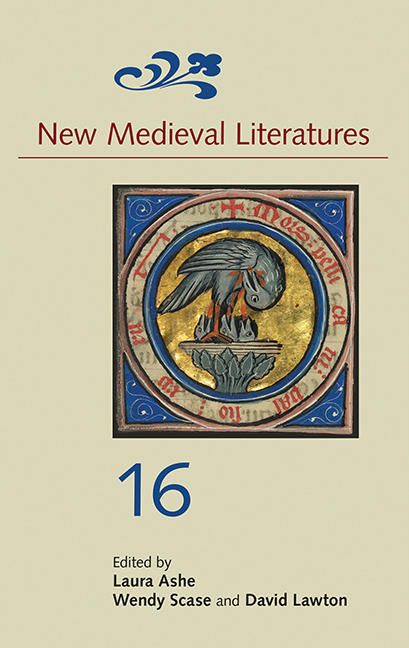Book contents
- Frontmatter
- Contents
- 1 The Book of the World at an Anglo- Norman Court: The Bestiaire de Philippe de Thaon as a Theological Performance
- 2 Monks, Money, and the End of Old English
- 3 Sustainability Romance: Havelok the Dane's Political Ecology
- 4 Locating the Border: Britain and the Welsh Marches in Fouke le Fitz Waryn
- 5 From disputatio to predicatio – and back again: Dialectic, Authority and Epistemology between the Roman de la Rose and the Pèlerinage de Vie Humaine
- 6 Mixed Feelings in the Middle English Charlemagne Romances: Emotional Reconfiguration and the Failures of Crusading Practices in the Otuel Texts
- 7 Circularity and Linearity: The Idea of the Lyric and the Idea of the Book in the Cent Ballades of Jean le Seneschal
- 8 ‘What shal I calle thee? What is thy name?’: Thomas Hoccleve and the Making of ‘Chaucer’
5 - From disputatio to predicatio – and back again: Dialectic, Authority and Epistemology between the Roman de la Rose and the Pèlerinage de Vie Humaine
Published online by Cambridge University Press: 05 July 2016
- Frontmatter
- Contents
- 1 The Book of the World at an Anglo- Norman Court: The Bestiaire de Philippe de Thaon as a Theological Performance
- 2 Monks, Money, and the End of Old English
- 3 Sustainability Romance: Havelok the Dane's Political Ecology
- 4 Locating the Border: Britain and the Welsh Marches in Fouke le Fitz Waryn
- 5 From disputatio to predicatio – and back again: Dialectic, Authority and Epistemology between the Roman de la Rose and the Pèlerinage de Vie Humaine
- 6 Mixed Feelings in the Middle English Charlemagne Romances: Emotional Reconfiguration and the Failures of Crusading Practices in the Otuel Texts
- 7 Circularity and Linearity: The Idea of the Lyric and the Idea of the Book in the Cent Ballades of Jean le Seneschal
- 8 ‘What shal I calle thee? What is thy name?’: Thomas Hoccleve and the Making of ‘Chaucer’
Summary
Modern critics on the whole have found it rather difficult to account for the success of Guillaume de Deguileville's Pelerinage de Vie Humaine with medieval readers, and the poem is still widely misunderstood whenever it is not overlooked or dismissed out of hand. Things have begun to improve over the last decade, with the appearance of a number of studies on the circulation, translation, and reception of Deguileville. This is a welcome development, but it may also have distracted our attention from the internal workings of this influential, rich, and complex allegory, still insufficiently studied in terms of its place within multiple overlapping contexts – intellectual, literary, cultural, and political. The survival of two rather different versions of the poem, PVH1 from 1331, and PVH2 from 1355–6, further complicates the picture, but affords us the rare opportunity to trace the internal tensions, shifts, and transformations of an author's poetic vision over time.
The Pelerinage presents an account of the poet's ostensible dreamvision, and features a pilgrim- persona who is simultaneously dreamer, first- person narrator, protagonist, and expositor of his quest. This complex narrative configuration of the subject develops in the wake of the Roman de la Rose, Deguileville's declared model and evoked in the opening lines of his poem (PVH1, 7–11). Yet Deguileville's poem also seeks to harness the energies of first- person allegorical narrative to avowedly spiritual and salvific ends. The pilgrimage thus figures a complex pedagogical trajectory, and the reader is invited to identify with the pilgrim and participate actively in the learning process. Deguileville uses the Augustinian motif of the pilgrimage to figure the learning process of the Christian wayfarer, and indeed the poem as a whole develops an unmistakeably Augustinian/Platonist anthropology and epistemology. Augustine had developed the idea of the Christian life as a journey especially in his hugely popular De Doctrina Christiana, whose influence on Deguileville has already been suggested by other critics. In the De Doctrina the journey traces an itinerary of Christian learning that enables the individual pilgrim's ‘return’ to his heavenly home (De Doctrina 1. 4. 4; 1. 10. 10; 1. 18. 17), and pilgrimage here visualizes a transformation that is at once interpretive, pedagogical, ethical, cognitive, and ontological.
- Type
- Chapter
- Information
- New Medieval Literatures , pp. 135 - 171Publisher: Boydell & BrewerPrint publication year: 2016



